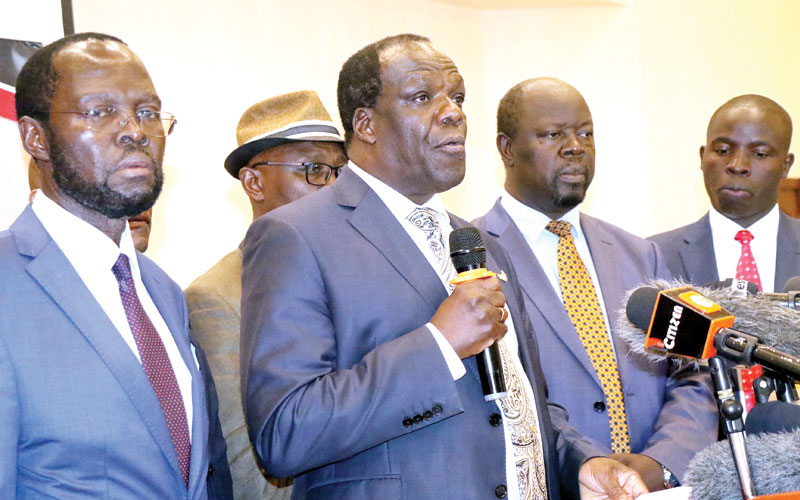CoG to appeal ruling on charged governors
By Hillary Mageka, December 17, 2019The Council of Governors (CoG) has said it will appeal a High Court ruling barring governors charged with economic crimes from accessing their offices for the duration of their trial.
Consequently, the CoG has also said it will move to the Supreme Court if it will be unsatisfied with the decision of the Court of Appeal to have the ruling, which has had far-reaching consequences on at least three county chiefs, set aside.
Addressing a press conference in Nairobi yesterday, CoG chairman Wycliffe Oparanya said the ruling by High Court judge Mumbi Ngugi contradicts the law on the removal of governors from office.
The ruling by Ngugi has so far locked governors Moses Lenolkulal (Samburu), Ferdinand Waititu (Kiambu) and Mike Sonko (Nairobi) out of their county offices.
“As a matter of common interest, the county governments will urgently move to court over the ruling seeking governors to step aside when charged on corruption matters as he has been witnessed in the cases of Kiambu, Samburu and Nairobi City County,” said Oparanya.
“We will also seek the Attorney General’s advice and interpretation on judge Ngugi’s ruling and its ramifications,” he added.
Oparanya, who is the Kakamega Governor was flanked by counterparts Hillary Barchok (Bomet), James Ongwae (Kisii), Anyang’ Nyong’o (Kisumu), Ali Roba (Mandera) and Stephen Sang (Nandi).
People Daily has learnt that the decision to appeal Justice Ngugi’s ruling is weighing heavily on some governors’ mind including those who are under active investigations for fear of being barred from accessing their offices for the remainder of their term should they be charged.
So tense is the situation, that some county chiefs are accusing the Director of Public Prosecutions (DPP) of allegedly scheming to exploit the ruling to have the governors facing charges in court locked out of office.
So far only Migori Governor Okoth Obado and his Busia counterpart Sospeter Ojaamong who are out on bail after being charged with various criminal offences have been allowed to access their respective offices.
The decision of the CoG comes after in late July Justice Ngugi held that governors, like other civil servants, should step aside once charged with a criminal offence and their roles completely taken over by their deputies until their cases are heard and determined.
However, the judge ruled that a governor can only access his or her office with written permission of the Ethics and Anti-Corruption Commission (EACC).
Justice Ngugi observed that Section 62(6) of the Anti-corruption and Economic Crimes Act, apart from obfuscating, helps obliterate the “political hygiene” as it was contrary to the provisions of the constitutional requirement of integrity in governance, and against the national values as well as principles of leadership and integrity.
According to Justice Ngugi, allowing persons facing criminal charges to public offices entrenches corruption and impunity in the land.
“Would it serve the public interest for him to go back to office and preside over the finances of the county that he has been charged with embezzling?” she asked.
The need for governors facing economic crimes to stay away from their offices got on track when Judge Ngugi upheld a decision of a magistrate barring Lenolkulal from accessing his office.
Chief Magistrate Lawrence Mugambi followed suit and barred Waititu from accessing his office.
More Articles

